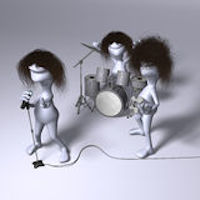When you have a favorite band, you can’t help but want to know more about them. Usually finding out more means tuning into interviews where that band answers the questions the public wants to know. Questions about how they met, where their name came from, or what some of their cool stories are. These are the most common questions asked, according to Digital Music News.
With any luck, we find most the answers to these questions intriguing and great conversation points. But to be honest: these response can often come across as scripted fiction. We’ve all done it. We have a story we think is fascinating––we start telling it to our friends, we realize “this could be more dramatic if I just added a little something…”
But how much does this embellishment really matter? Should we feel betrayed that our music heroes exaggerate their tale a bit?
If one reaches the rarified stratosphere of becoming a cultural icon, this usually means having an interesting backstory ready, one that captivates people. Boring personas and mundane tales don’t quite resonate regarding legends and stars. We like our idols to have something compelling and captivating to tell our friends about. Of course, not every band has a riveting or glamorous story. So what do you do when you need more voltage in the circuit? You make it up. With the proper creative spark, an interesting tale can be spun.
The Digital Music News article is about this very notion of making life sound more thrilling, and enthralling, than it really is. The piece details not only seven questions commonly asked of bands, but also the best way to respond (and embellish) them.
Is it a crime to change your story from, “I met my drummer in music class” to “we met during an ascent on Mount Everest?” No, its definitely not the straight-up story. But it’s way more entertaining than the naked truth.
Show biz is just like politics. A politician’s career relies on public opinion. It’s usually imperative that the public like them. More often than not, this requires twisting and bending the truth to make the candidate sound more intriguing and impressive than they really are.
Of course, unlike politics, the white lies of a band about their origins doesn’t often undermine the integrity of the country––and they usually aren’t harmful to society.
It serves the function of making our idols look more attractive to us. Besides, how could we convince our friends how great our favorite band is of they all met at…y’know…band camp?


